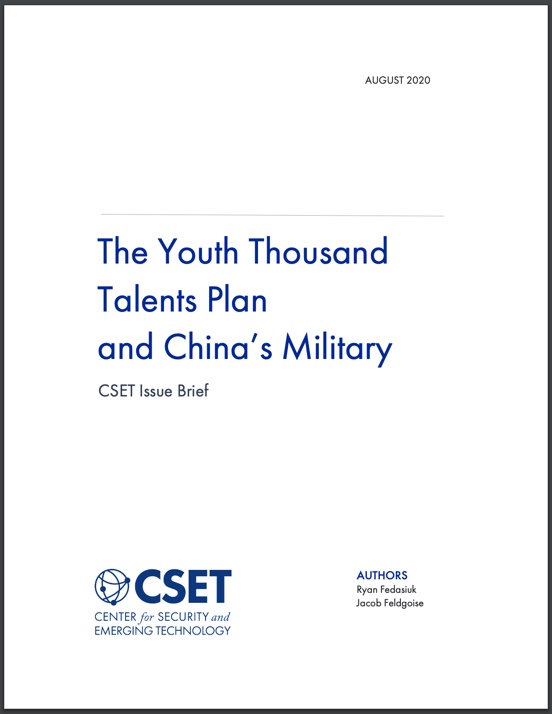President Xi Jinping made equipping China’s defense-affiliated science and technology professionals with overseas training a key goal during the military’s reorganization in 2016.1 In the years since, U.S. policymakers have voiced concerns that Chinese scientists may pursue advanced training in the United States or other countries, then return to China to aid in the country’s military modernization. Some of the primary vehicles by which the Chinese Communist Party (CCP) attracts Chinese scientists back to China are state- and Party-sponsored talent plans, the largest being the Thousand Talents Plan (千人计划; TTP).2
To understand the scope of these programs better, CSET located and analyzed publicly available lists of the 3,586 disclosed individuals selected to receive awards under the “youth” branch of China’s national Thousand Talents Plan during the program’s lifetime, from 2011 to 2018. In 2019, the Chinese Ministry of Science and Technology absorbed and reorganized the Thousand Talents Plan and its administering agency.3 This paper explores awardees’ career moves, including where researchers worked at the time of award and their intended destinations in China. Key takeaways include:
- From 2011 to 2018, the CCP Organization Department and State Administration of Foreign Experts Affairs offered nearly 3,600 people monetary awards and positions under the Youth Thousand Talents Plan.
- The clear majority of YTTP awardees were offered positions at China’s leading civilian universities, which are not necessarily affiliated with the People’s Liberation Army.
- About 300 awardees (eight percent) were offered positions at 11 institutions that are part of, or have close relationships with, China’s defense industry.
- About 500 awardees (14 percent) were offered positions at laboratories managed by the Chinese Academy of Sciences.
- Two thirds of awardees were employed in the United States when offered awards and positions at Chinese research institutions.
Download full issue brief
The Youth Thousand Talent Plans and China’s Military- Joel Wuthnow and Phillip C. Saunders, “Chinese Military Reforms in the Age of Xi Jinping: Drivers, Challenges, and Implications,” Center for the Study of Chinese Military Affairs, China Strategic Perspectives, no. 10 (March 2017): https://www.hsdl.org/?view&did=810931.
- “Threats to the U.S. Research Enterprise: China’s Talent Recruitment Plans,” Senate Permanent Subcommittee on Investigations, November 2019, https://www.hsgac.senate.gov/imo/media/doc/2019-11-18%20PSI%20Staff%20Report%20-%20China’s%20Talent%20Recruitment%20Plans%20Updated.pdf.
- The Thousand Talents Plan was replaced by the National High-end Foreign Experts Recruitment Plan in 2019. See explanations in “Thousand Talents Plan,” China Innovation Funding, 2019, http://chinainnovationfunding.eu/thousand-talents-plan/; and “National High-end Foreign Experts Recruitment Plan (2019 annual call),” China Innovation Funding, 2019, http://chinainnovationfunding.eu/project/2019-high-end-foreign-experts-recruitment-plan/.
